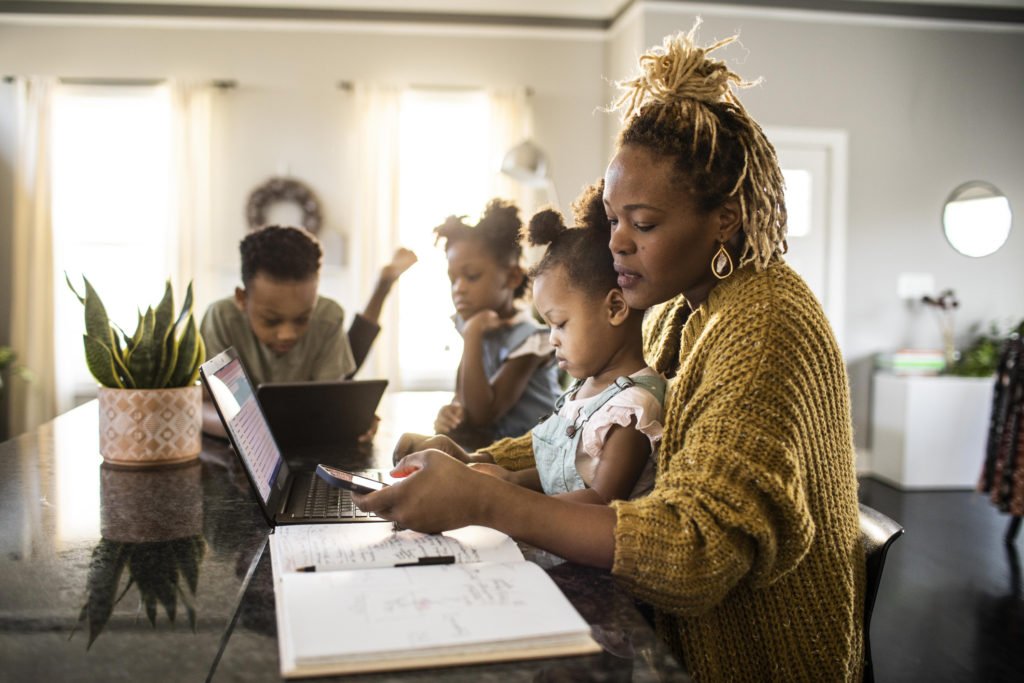If I learned one lesson when the pandemic hit, it was that I can’t do it all in this VUCA world. Shortly after, the more painful truth was realizing all that I had sacrificed in order to try. Boundaries, sleep, hobbies, joy, the list went on. To be the “best mom” and the “most successful,” I did everything I could to live up to the unrealistic and unsustainable expectations society places on working women, regardless of the consequences.
If I learned one lesson when the pandemic hit, it was that I can’t do it all. Shortly after, the more painful truth was realizing all that I had sacrificed in order to try. Boundaries, sleep, hobbies, joy, the list went on. Click To TweetI wasn’t alone. All around the country women everywhere were having the same revelation. We collectively stared down the truth that for years we had been wearing burnout as some kind of distorted gold star that measured our worth in its weight of exhaustion. Pepper in the layered assumptions and bias I navigate daily as a Black neurodivergent woman, and the “I’m going to prove you all wrong” complex was consuming me whole. As the lines between work and home faded, my perfectionist overachiever armor tarnished quickly, and with it I crumbled.
Pepper in the layered assumptions and bias I navigate daily as a Black neurodivergent woman, and the 'I’m going to prove you all wrong' complex was consuming me whole. Click To TweetWhy it matters
Around the same time, I came across Amy Westervelt’s quote: “We expect women to work like they don’t raise children, and raise children as if they don’t work.” According to the numbers, it’s true. Though women make up half of the workforce, they have continued to take on the majority of home life responsibilities throughout generations. The pandemic also illuminated that it’s more than working moms who are impacted by unattainable expectations — it’s caregivers of all sorts. Two thirds of caregivers in the U.S. are women, tending to the needs of children, aging parents, sick family members and more, all while fulfilling rigid expectations on the job. This is important to women’s equity, because we compete in the workforce while carrying extra unpaid weight on our shoulders during the climb.
Two thirds of caregivers in the U.S. are women, tending to the needs of children, aging parents, sick family members and more, all while fulfilling rigid expectations on the job. Click To TweetWestervelt’s words rang out like an alarm signal, and I knew I had to make a change. What if I just simply stopped doing everything everywhere and navigated work life balance on my own terms?
Taking back power
It started with protecting my energy, little by little. This meant at work I would shut off my web camera, take breaks, and turn down extra assignments when I needed to. I’ll admit, pushing back on what appeared everyone else was doing was intimidating.
I started protecting my energy. At work I would shut off my web camera, take breaks, and turn down extra assignments when I needed to. Pushing back on what appeared everyone else was doing was intimidating. Click To TweetAwkward at first, prioritizing my wellbeing felt like I was doing something wrong. With each day I got more familiar with stating how I feel and asking for what I need. Now rather than apologize for being human, I simply name it. I find myself deleting the beginnings of my emails that instinctively start with “I’m so sorry I need the following,” and instead type, “I appreciate your flexibility.”
This shift in mindset also spilled over into my home life as well. The first step was acknowledging that at some point I began viewing rest as a luxury that needed to be earned, and delegation as a worst-case scenario. I learned to check my misdirected pride when my instinct was to power through busy days and weeks, without ever asking for support. Now rather than automatically managing the details of our lives, I pause and ask myself, “Is this a priority?” If the answer is “yes,” I co-create a plan with my husband that includes how we’ll support each other while getting life tasks done together. Over time I’ve begun to denounce the “she does it all” mentality, because for me it cost too much to sustain.
Rather than automatically managing the details of our lives, I ask myself, 'Is this a priority?' If the answer is 'yes,' I co-create a plan with my husband on how we’ll support each other while getting life tasks done together. Click To TweetThreats to women’s equity
Identifying complacency by evaluating individual mindsets and habits is a start, but for true equity to be attained, we have to recalibrate the social norms that programmed our widespread beliefs in the first place. In other words, what if the revolution started with normalizing self-care and wellness over competition and productivity?
What if the revolution started with normalizing self-care and wellness over competition and productivity? Click To TweetMy mind drifts to the implications of that “what if” and I often reimagine spaces where we’ve deconstructed what is normal, what is good, and what is enough. In those spaces, it doesn’t take an act of courage to take care of yourself, it is expected. In those spaces we don’t expect people to live around work, we honor that people work around life. And in those spaces, we’d no longer normalize 50+ hour work weeks, phone calls during off hours, or pushing through exhaustion as a hallmark of employment.
Reimagine spaces where we’ve deconstructed what is normal. It wouldn't take an act of courage to take care of yourself, it is expected. We wouldn't expect people to live around work, we honor that people work around life. Click To TweetOur path forward
As a community, confronting social expectations and demanding balance in every area of life leads to collective success without sacrifice. Normalizing this would mean women especially would no longer be put into impossible situations that ultimately led to the disparities we see today in pay, promotions, and power.
As individual women, the pressure to conform to the climates that surround us is ours to accept or deny. Generations of women before us opened doors to opportunity, and now we have a chance to ensure that having it all doesn’t have to cost us everything.


















